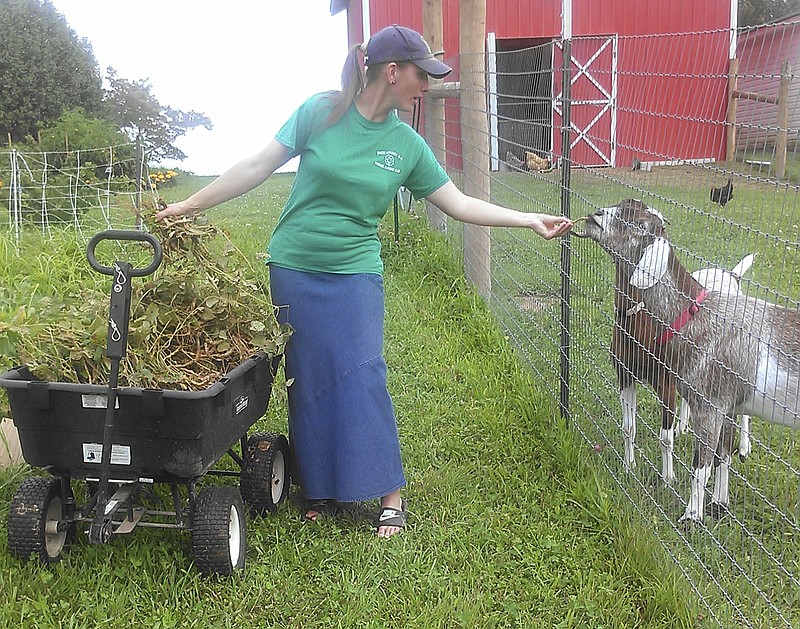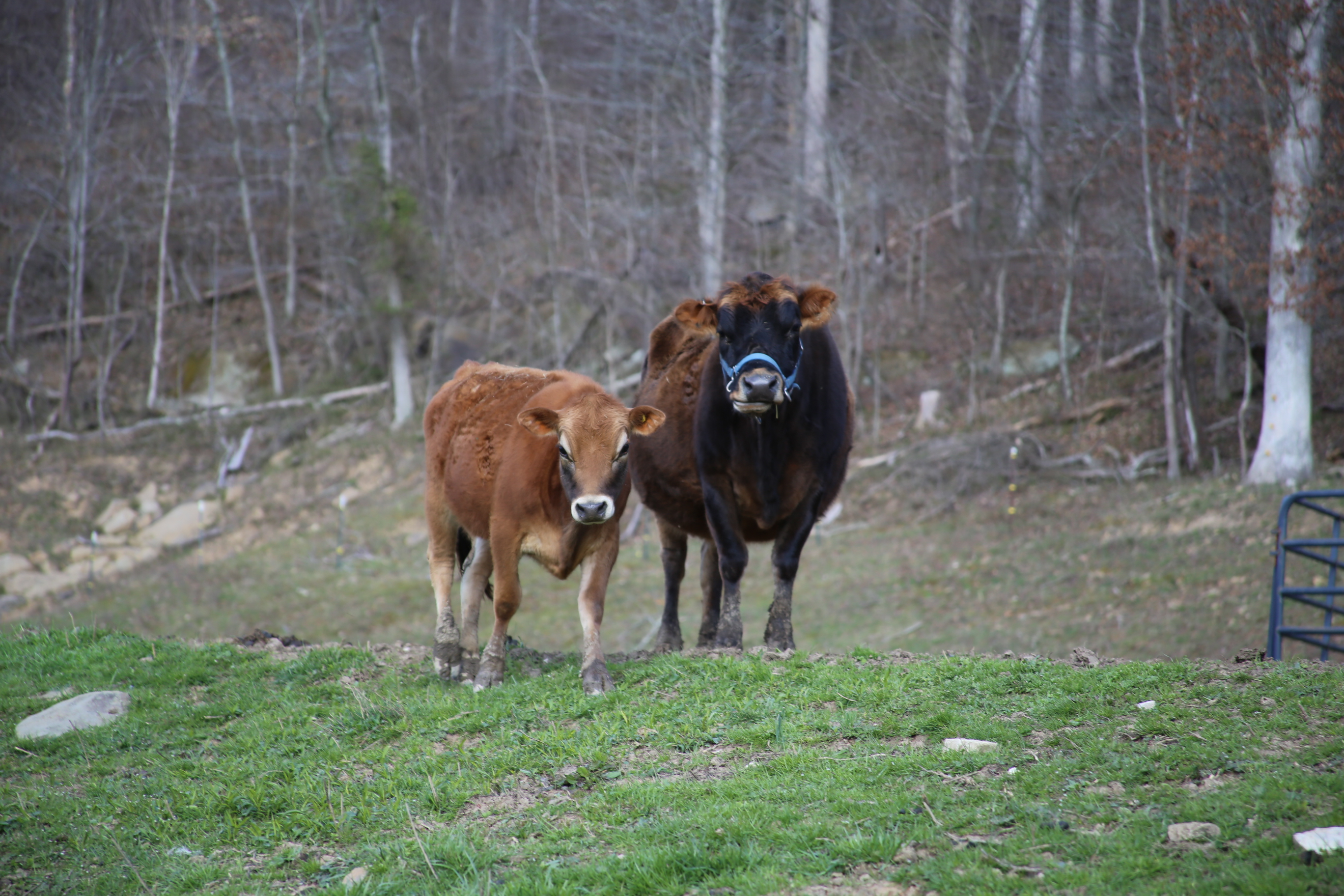If you go
› What: The Great Appalachian Homesteading Conference› When: 9 a.m-5 p.m. CDT Saturday.› Where: Cumberland County Fairgrounds, 1398 Livingston Road, Crossville, Tenn.› Admission: $32.64 adults, $16.82 children.› Information: http://tinyurl.com/jed7d29
Trying to get back to nature? Return to the way things were in the past? Maybe you want to make your own soap, can your own vegetables, perhaps even raise your own animals - let's say goats, because goat milk would be easier to get since they allegedly eat anything and are easier to herd.
Think again.
"Goats are very high maintenance," says the aptly named Tinia Creamer, who raises goats and cows at Lucas Farms in West Virginia. "They are temperamental. Goats must have grain to eat.
"Anyone who wants to produce grass-fed organic milk must go with cows, not goats. A person really needs to think about whether he or she has the patience and the steady personality to deal with goats."
This week, Creamer is driving from West Virginia to be part of the Great Appalachian Homesteading Conference in Crossville, Tenn. The event is designed for suburban folks who daydream of whipping up an omelet with freshly laid eggs from a backyard chicken coop, then flavoring the dish with cheese made from adorable little goats nibbling backyard grass.
"There is a huge demand to get back to the basics," says Patara Marlow, who is hosting the conference along with her husband, James, at the Cumberland County Fairgrounds. "It is a calling to be self-sufficient once again. People prefer to know what they are consuming and understand the value in what true 'farm fresh' foods are. They do not compare to anything you will buy at a grocery store.
"I also feel people are concerned about not knowing the basic skill sets that saw their great-great grandparents through the toughest of times such as the Great Depression or World War II," says Marlow, whose farm is called Appalachia's Homestead. "There is a huge quest to get back to those skill sets."
On their farm, the Marlows grow tomatoes, corn, potatoes and beans, among other vegetables, then can them. They raise more than 150 chickens, plus pigs, ducks, goats and a dairy cow. They cook over a wood stove, make their own bread and use cast-iron pots and pans. In addition, they homeschool their three boys, who range from elementary to high-school age.
At the conference, classes include Canning 101, How to Raise Baby Chicks and Chicken Breeds, Homemade Biscuits and Wood Stove Cooking, Keeping a Winter Home Warm with a Wood Stove, Homeschooling and Basic Soap Making, a course taught by veteran East Tennessee homesteader Jamie McCloud. So the conference has plenty of information for hardcore off-the-grid-ers who may need to butcher a goat then make the meat into a stew over a wood fire stove that heats the whole house.
Speakers who will teach classes from 9 a.m. to 5 p.m. are experts on everything from using a Dutch oven over a wood fire to make something called Hillbilly Pie (online recipes differ on what hillbillies actually like in their pies) to solar power to growing herbs for medicine. (No, not marijuana, other herbs.)
"First, homesteading is about skills," Marlow says. "There are so many basic skills that anyone anywhere can learn. Basic canning, bread making, sewing, soap making, growing herbs and so much more can be gained by simple books, YouTube and the Internet these days. You can perform those tasks anywhere."
Conference attendees "can also work with folks who have land as barter for trade and learn skill sets such as gardening, raising chickens, rabbits or quail for meat production."
Representatives from Molly Green magazine, which is devoted to homesteading and whose owners live near Crossville, will attend. Senior editor Dara Ekanger says that millennials' love of DIY living and acquiring recession survival skills such as gardening and carpentry are one reason homesteading has become an intergenerational passion.
"There is a huge surge of interest in all age groups for a more independent, simple way of life that connects us to the land and prepares us for the future," Ekanger says.
"We are, in fact, featuring a 22-year-old young lady in our fall issue. A homeschool graduate, she runs her own bookkeeping business - in addition to working two other part-time jobs - and saved up her money to purchase a 4.5-acre homestead. She raises horses, chickens, a large garden, preserves her own produce and is remodeling the house as funds are available. She dreams of being completely self-sufficient one day."
Marlow says moving "off the grid" is a king-sized task for most people, and there are important steps that must be taken prior to the move.
"It is critical to understand what resources you have and how to utilize them; they have tremendous value," she says. "I would always stress good water sources and wood heat sources are critical. The easiest for many is obviously rain catchments and certainly a wood stove."
Creamer will teach an introductory course on raising dairy goats and cows. She knows that dairy farmers are often battered by plunging milk prices and brutal competition from enormous corporate milk producers. Milk prices tumbled from more than $24 for about 9 gallons in 2014 to around $15 this winter, reminding farmers that, in 2009, prices fell below $12, bankrupting many. But Creamer says there is a way for small dairy farms to thrive through a concept called "herd sharing."
In the deal, customers pay to "buy" into a dairy farmer's herd, she explains, "and get fresh raw milk right from the farmer. It increases the farmer's profit margin by cutting out the middleman. A farmer can get $10 per gallon through herd share compared to about $1 a gallon selling milk that will end up in a grocery store."
A course on Producing Meat on a Homestead will be headed by Rachel Payne of Tiramar Farms, located outside Memphis. She earned a bachelor's degree in English and was on her way to a master's when she decided to ditch that path and follow her family's passion for farming. Like many millennials, she finds the DIY aspects of homesteading daunting but alluring.
"My forefathers and mothers were tough people, the kind of farmers and homesteaders who made it work because they had to. My maternal great-grandmother traveled from Texas to the Arkansas mountains in a covered wagon," she writes on her blog. "There they became sharecroppers and lived in a wood cabin on the hillside. My maternal grandmother taught me sewing, cooking, gardening, preserving food, soap making. She had a goat herd of her own for many years, and my mother had her own goats when I was young as well."
There may be some people out there thinking that homesteading sounds like a punishment North Korea might level on someone convicted of having a surly facial expression when looking at a photo of Kim Jong Un. And truthfully, it will not sound like any fun to everyone. But those who love the lifestyle happily maintain that it is more than fun, it is joyous.
Lisa Barthuly, editorial director Molly Green magazine, made the switch "years ago."
"We made a deliberate choice to wander the path less traveled - a path walked together as family, showered with blessings and lined with Mason jars. It's one of hard work, lessons learned, a Jersey milk cow and a menagerie of farm animals. A homemade life.
"We live in a 1913 schoolhouse," Barthuly says. "We have electricity, but it's limited. We have no air conditioning and use wood exclusively for heat. In the summer we set up an outside kitchen, including a solar oven, because it's just too hot inside, and even this past winter we cooked exclusively with our wood cook stove/oven."
Barthuly concedes that paid vacations in the 9-to-5 working world may not be possible for homesteaders, but she adds that her family has fun playing baseball in their immense front yard, hiking in the national forest next to their property and watching wildlife drink from the creeks and streams that crisscross the nearby woods.
Contact Lynda Edwards at ledwards@timesfreepress.com or 423-757-6391.

